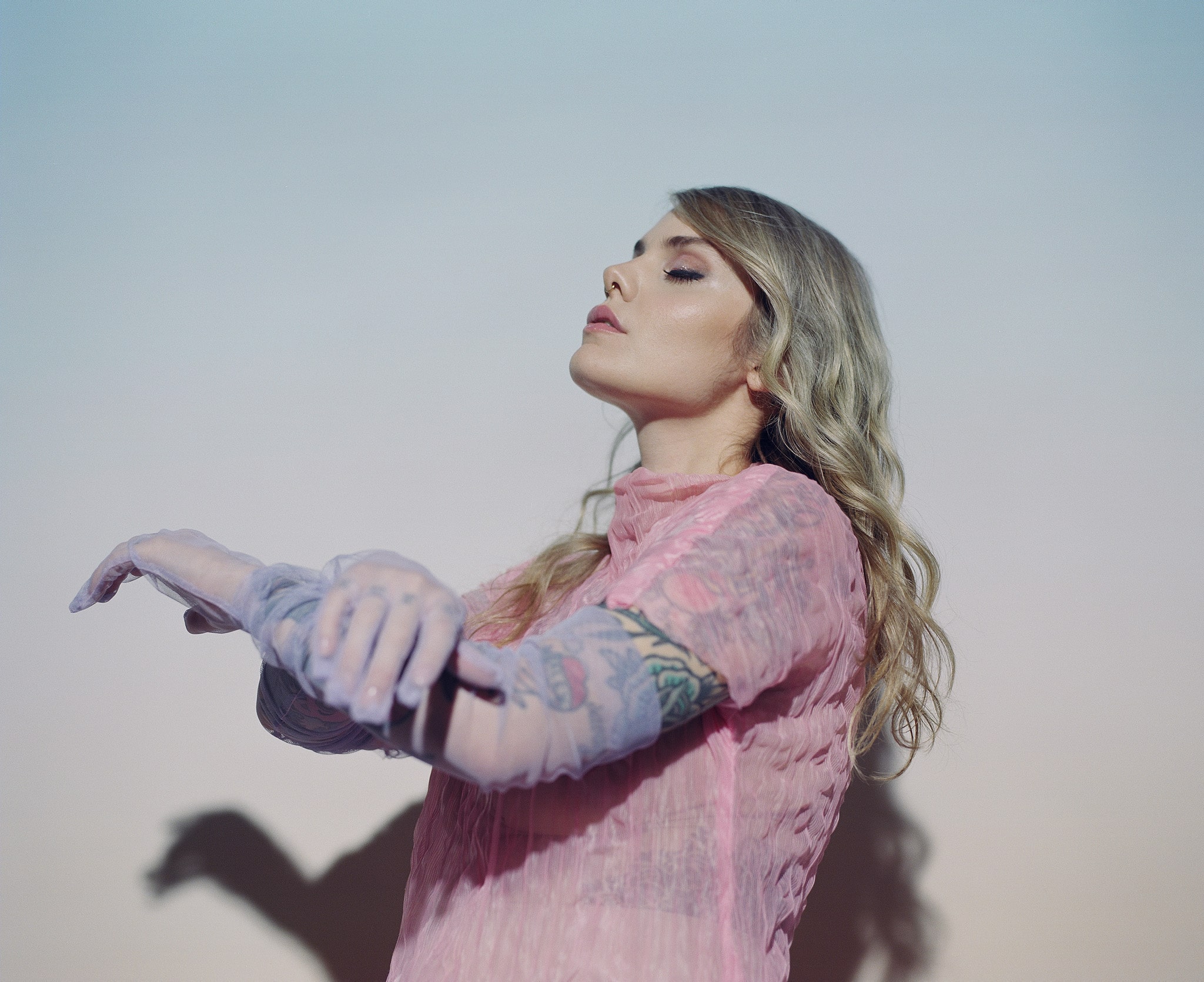You might be surprised to know that francophone pop artist Cœur de pirate has a punk side. At age 15, the pianist and singer-songwriter, born Béatrice Martin, joined her earliest band, the emo/hardcore group December Strikes First. Though the only proof of their existence from the mid-2000s is a MySpace page littered with broken links, her experiences in Montreal’s all-ages music scene sent Martin on a path towards personal and artistic discovery.
In 2016, Martin made one of the punkest moves of her career when she publicly identified as queer. With an open letter written in response to the tragic Pulse nightclub shooting, she declared, “I’m coming out for the victims that lost their lives because they wanted to celebrate who they truly were.” This had the effect of turning Cœur de pirate’s concerts into a safe space for LGBTQ2S+ crowds, as well as opening her heart to new possibilities during her former relationship with trans punk hero Laura Jane Grace.
During the pandemic, while working as a singing coach on La Voix (Quebec’s answer to The Voice), Martin temporarily lost her own voice following an operation to remove a hemorrhagic polyp from her vocal cords. She responded with the same sense of resilience that inspired her open letter and released Perséides, a collection of instrumental piano pieces. After a tense period that she described as “a month of hardcore convalescence where I couldn’t speak,” Martin began working on Impossible à aimer, her latest album, released in October. Informed by the romance and heartbreak of 1970s disco, its arrangements are packed with lush strings, pumping synths and grooves tailor-made for the dancefloor.
In conversation with Xtra, Martin flashes back to her first band, discusses the formative importance of Sailor Moon and explains how she was still performing in her seventh month of pregnancy. Cœur de pirate is still punk.
Your first band, December Strikes First—what are your memories of that time?
Oh, this is good! [Laughs.] It was really just a band of teenagers. Back in 2005 or 2006, emo was a big thing and the hardcore scene was thriving. Montreal had a pretty cool one where kids could just go to this place called Café L’Inconditionnel. It was a really rugged venue. Thank god there were never any fires there or anything, because it was terrible for safety. They would have AA meetings in the front and in the back there was a venue. People could book the room for very cheap, though, and a lot of cool hardcore bands passed through.
I really liked bands like Alexisonfire and Thursday, so I started making music in that genre with a few of my high school friends, and we ended up playing a few shows there. I was just playing keyboards, and it was mostly sounds. [Laughs.] I also did some backing vocals. The band was short-lived, but it was a lot of fun!
After that, what inspired you to start making music on your own?
I think everything happens for a reason. Being in contact with music and playing shows when I was 15 is definitely something that gave me a little spark. I didn’t think I was a very good singer, but it got me into Alexisonfire, and that got me into Dallas Green. The first thing I ever recorded myself singing was this song called “Comin’ Home” by City and Colour. I remember recording that and putting it on MySpace. That was the beginning of me putting my stuff out there. I was always self-conscious because throughout my whole life people told me that I wasn’t that great of a singer.
Hearing City and Colour and other people venturing into that acoustic sound was important for me. Before that, the singers that actually made it had big vocals like Céline Dion. Do you remember that era? The pop songs on the radio were really pop and had intense singing. When I heard someone like Dallas Green, I thought he was amazing, but also that he fell into a different category. I felt I could do something similar and use my personal touch to create something that people could relate to.
You followed the punk to singer-songwriter pipeline!
Yes! [Laughs.]
I have to ask you about the open letter you wrote for Noisey in 2016. How did that feel for you to come out publicly after the Pulse nightclub shooting?
To me, it was kind of strange because I was always hinting about queer culture and my sexual orientation on social media. The people who have known me for a while knew that I wasn’t straight. I think it was obvious. When I came out, it was a direct reaction to the shooting that was very upsetting for me, and I was in a relationship with a trans woman at the time. It felt normal for me to say those things, and I don’t regret it today.
What was fascinating was seeing the reaction from my anglophone fans who like me but don’t really know me. Then on the French side it was a whole other vibe. It was strange to be met with so much love but also so much hatred. For me, it was meant to be liberating.
I was really moved by the way you wrote about watching Sailor Moon as a child in your open letter and the ways it depicted lesbian relationships, but how you felt you had to hide your feelings towards other girls at that age.
There was gender fluidity on Sailor Moon, too! They’re shapeshifters, which is amazing. It was very eye-opening for me at the time. I felt repressed in all of those feelings, so when I wrote the letter it was quite natural for me.
Did you feel like you had to continue hiding your feelings towards women as you became better known as a musician, staying in the closet in some areas of your life?
I think I just stayed in the closet naturally because I was rejected by women as a teenager. That really hurt my feelings. I had a huge crush on one of my girlfriends, and when she learned about it, she stopped talking to me. I think that happens to a lot of people. Maybe less so now because people are so open, but back then it was really hurtful.
I kind of just drifted towards men. [Laughs.] Maybe I would get rejected, maybe not, but at least I won’t lose any friends. It was easier and what the culture wanted me to do. I think I was very at odds with my sexuality for a long time, so that created a lot of frustration and insecurity.
What kinds of things happened after you wrote that letter? Did you connect with new groups of people or new sides of yourself?
The thing that happened that I’m most proud of is that it really created a safe space at my shows. After that letter came out, I remember looking at the crowds and seeing queer people actually making out. It made them feel safe to be there. That was really empowering for me, and I felt like I had done something right by the simple act of being who I am. I was really moved.
How did you first meet Laura Jane Grace?
I think it was through Twitter! [Laughs.] I don’t remember exactly. We talked about music first, and then she invited me to hang out. Things just kind of escalated from there.
You also got to sing with her band Against Me! Did that feel like expressing your punk side again, going back to December Strikes First?
Yeah, for sure! I loved being back in that environment, though I’ve never really left it to be honest. I’m still friends with lots of people in hardcore bands, and it’s cool to be a fan these days. The last show I went to was Silverstein!
Another wild thing that happened to you recently was that you lost your voice. How did that feel?
Basically what happened is that when TV shows started happening again, my voice had been kind of raspy for a while. I thought it was just allergies, but I didn’t know. Then when I realized that I was having a hard time singing, I went to see a doctor. They said I had a polyp on my vocal chords that was bleeding, and that I had to stop singing now and consider surgery. That was kind of daunting at first. But I learned to never take my voice for granted again. I really take care of my voice now. It’s something I thought I just had and would never lose. When you realize that something could happen to your livelihood, it’s another story.
What was the moment like when you could finally sing again?
It took a while before I could actually play shows. I’m still struggling with it because it’s like getting knee surgery before you have to run a marathon. So far so good, though!
Let’s finish up by talking about your new album. I understand it was supposed to be country music at first. How did you end up making disco songs?
Obviously we’ve been living through a pandemic and my music tastes from two years ago were very different. I had something else that I wanted to say and then everything happened. I started dabbling in other things and drifted towards that sound naturally. It’s a really nice way to sing about heartbreak and deception with these disco-y songs. I’m really into ’70s French chanson from the time back when disco was thriving with artists like Joe Dessin. I don’t know if you know him, but that’s classic, classic stuff. It was mostly based on that and we just had a lot of fun.
Are you learning some disco dance moves for your upcoming concerts?
I tried, but I’m just so pregnant that I can’t move around anymore! [Laughs.]
Oh wow! How far along are you?
I’m about 27 weeks along or seven months pregnant, so that’s the third trimester. I’m still playing shows right now. I actually have a show in Toronto in two days. You can totally do it—just roll around!
This interview, conducted on Oct. 27, was edited for length and clarity.


 Why you can trust Xtra
Why you can trust Xtra


